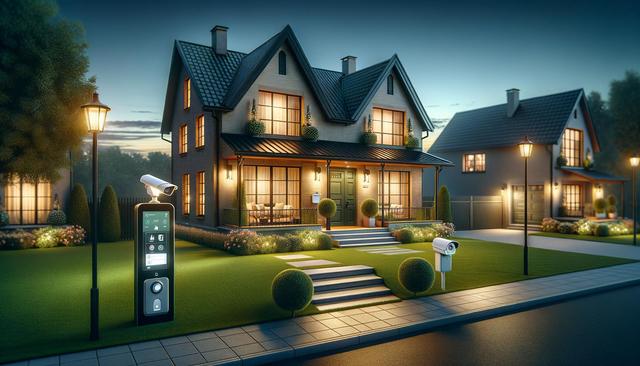
A Practical Guide to Home Security Systems
Understanding the Basics of Home Security Systems
Home security systems are designed to monitor and safeguard residential properties from various threats, including burglary, fire, and unauthorized access. At their core, these systems typically include components like sensors, alarms, control panels, and sometimes cameras. The goal is to detect suspicious activity and alert homeowners or authorities before any damage or loss occurs. While traditional security setups required professional installation and complex wiring, today’s systems offer much more flexibility, with wireless and smart technologies leading the way.
Most systems work by monitoring entry points—such as doors and windows—and common areas inside the home. If a sensor is triggered, the system may activate a loud siren, send a notification to the homeowner, or even alert a monitoring center. The effectiveness of these systems relies on proper placement of sensors, timely updates, and regular testing. Whether you live in an apartment or a large house, there are scalable options available to suit different living environments.
Key Features to Consider When Choosing a System
When selecting a home security system, it’s important to assess your specific needs and the features that can address them. Different homes have different vulnerabilities, and a good security setup should reflect that. Here are some commonly sought-after features:
- Motion detectors
- Door and window sensors
- Surveillance cameras
- 24/7 monitoring services
- Smartphone integration
Smartphone integration, for instance, allows you to monitor and control your system remotely, which is especially useful for frequent travelers or working parents. Some systems also offer environmental sensors that detect smoke, carbon monoxide, or water leaks—adding an extra layer of safety. The presence of automation tools, such as setting lights to turn on at certain times or remotely locking doors, can further enhance both security and convenience.
Budget is another critical factor. Some systems involve a one-time purchase, while others require monthly subscriptions for professional monitoring. Understanding the total cost of ownership is essential to avoid unexpected expenses down the line.
DIY vs. Professionally Installed Systems
Homeowners today can choose between do-it-yourself (DIY) security systems and professionally installed ones. Each option has its advantages and limitations. DIY systems are typically more affordable, easy to install, and customizable. They are ideal for renters or those who prefer to handle tech setups personally. Many DIY kits come with pre-configured settings and simple app-based controls, making them accessible even for beginners.
On the other hand, professionally installed systems may offer a higher degree of reliability and support. These often include a consultation to assess your home’s vulnerabilities and a technician to ensure everything is installed correctly. Additionally, some insurance companies may offer discounts for homes equipped with professionally monitored systems, which can offset part of the cost.
It’s worth noting that while DIY systems provide flexibility, they may lack the comprehensive coverage or response coordination that professional services deliver. For homeowners with larger properties or more complex needs, professional installation might be the more suitable route.
Smart Integration and Home Automation
One of the notable trends in home security is the integration with broader smart home ecosystems. Many modern systems now work seamlessly with devices like voice assistants, smart thermostats, and lighting controls. This integration not only enhances security but also improves daily living convenience. For example, you can set routines such as arming the system when you leave the house or disarming it as you unlock the front door with a smart lock.
Home automation can also simulate presence when you’re away, reducing the likelihood of a break-in. Features like automated lighting, scheduled blinds, or even playing sounds through smart speakers can deter potential intruders. These functions can typically be controlled through centralized apps, giving users easy access from anywhere with an internet connection.
While smart features offer significant advantages, they also introduce new considerations, particularly around cybersecurity. Ensuring your devices are regularly updated and using strong passwords are essential steps in maintaining digital security alongside physical protection.
Maintaining and Upgrading Your Home Security System
Installing a home security system is not a one-time task. Regular maintenance is crucial to ensure optimal performance and reliability. Simple steps like testing sensors, checking camera angles, and replacing batteries can go a long way in keeping the system effective. It’s also wise to review and update your emergency contacts in the control panel settings periodically.
As technology evolves, so do the capabilities of home security systems. Upgrading your system to include newer, more advanced features can enhance your home’s protection. For example, switching from analog to high-definition cameras or adding facial recognition technology can provide clearer insights during incidents. Similarly, integrating new sensors to detect additional risks such as glass breakage or temperature changes can provide a more comprehensive safety net.
Home security providers often release firmware updates and new features, so staying informed about these improvements is beneficial. Many systems also offer modular upgrades, allowing you to add or replace components without overhauling the entire setup.
Conclusion: Making Home Security a Priority
Investing in a home security system is a proactive step toward ensuring the safety of your loved ones and your property. With a wide range of options available—from basic DIY kits to sophisticated, professionally monitored systems—there is something suitable for every household and budget. Evaluating your needs, understanding the available features, and staying updated with the latest technology can help you make informed decisions. Ultimately, a well-maintained home security system not only deters unwanted incidents but also provides the peace of mind that your home is being watched over, even when you’re not around.


